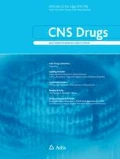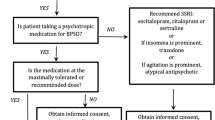Abstract
Summary
Although dementia is common among the institutionalised elderly, the majority of patients with dementia are cared for at home by nonprofessional caregivers, usually a spouse or adult child, As dementia progresses, the role of the caregiver expands from assistance with meal preparation, financial planning and medication administration to include personal care and decision making responsibilities. The chronic burden of these caregiver responsibilities affects the emotional and physical health of the caregiver and, as a result, can affect the patient.
It is often caregivers who first seek a diagnosis and treatment for patients with dementia. Medication is becoming a more important part of the treatment of these patients. Tacrine is now available forthe treatment of Alzheimer’s disease in some countries, and other drugs are being investigated. Drugs have also been shown to be effective in modifying the risk factors for vascular dementia and in the treatment of behavioural problems associated with dementia.
The administration of medication, monitoring of effectiveness and identification of adverse reactions are important aspects of caregiving and require interaction between the caregiver and the prescriber. The role of the caregiver in assessing the efficacy and adverse effects of medication and the impact of such medication on caregiver burden should be considered in the development of new treatments. There are instruments available to quantify the observations of caregivers, but few have demonstrated sensitivity or responsiveness to change in disease severity over time. Very little is known about the validity and reliability of caregiver observations. Further research needs to be done to develop and test instruments to capture information related to the function of patients with dementia and to caregiver quality of life.
Similar content being viewed by others
References
Mortimer JA. The epidemiology of dementia: international comparisons. In: Brody JA, Maddox GL, editors. Epidemiology and aging. New York: Springer, 1988: 150–64
Evans DA, Funkenstein HH, Albert MS. Prevalence of Alzheimer’s disease in a community population of older persons. JAMA 1989; 262: 2551–6
Jorm AF, Korten AE, Henderson AS. The prevalence of dementia: a quantitative integration of the literature. Acta Psychiatr Scand 1987; 76: 465–79
AARP & The Travelers Companies Foundation. A national study of caregivers: final report. Washington, DC: American Association of Retired Persons, 1988
Stone R, Cafferata G, Sangl l. Caregivers of the elderly: a national profile. Gerontologist 1987; 27: 616–26
Barr IK. Warshaw Ll. Stress among working women: report of a national survey. New York: The New York Business Group on Health, Inc., Feb 1993
Katzman R, Jackson JE. Alzheimer’s disease: basic and clinical advances. J Am Geriatr Soc 1991; 39: 516–25
Select Committee on Aging, House of Representatives. Exploding the myths: caregiving in America (publication no. 99-611). Washington, DC: U.S. Government Printing Office, 1987
Gallagher D, Wraetz A, Lovett S, et al. Depression and other negative affects in family caregivers. In: Light E, Lebowitz BD, editors. Alzheimer’s disease treatment and family stress: directions for research. (DHHS publication no. ADM89-1569). Rockville, MD: National Institute of Mental Health, 1989
Pruchno RA, Resch NL. Husbands and wives as caregivers: antecedents of depression and burden. Gerontologist 1989; 29: 159–65
Gallagher D, Rose l, Rivera P, et al. Prevalence of depression in family caregivers. Gerontologist 1989; 29: 449–56
Clipp EC, George LK. Psychotropic drug use among caregivers of patients with dementia. J Am Geriatr Soc 1990; 38: 227–35
Wright LK, Clipp EC, George LK. Health consequences of caregiver stress. Med Exerc Nutr Health 1993; 2: 181–95
Kiecolt-Glaser JK, Dyer CS, Shuttleworth EC. Upsetting social interactions and distress among Alzheimer’s disease family care-givers: a replication and extension. Am J Community Psychol 1988; 16: 825–37
Clipp Ee, George LK. Caregiver needs and patterns of social support. J Gerontol 1990; 45: SI02–11
George LK, Gwyther LP. Caregiver well-being: a multidimensional examination of family caregivers of demented adults. Gerontologist 1986; 26: 253–9
Pruchno RA, Potashnik SL. Caregiving spouses: physical and mental health in perspective. J Am Geriatr Soc 1989; 37: 697–705
Baumgarten M, Hanley JA, Infante-Rivard C, et al. Health of family members caring for elderly persons with dementia: a longitudinal study. Ann Intern Med 1994; 120: 126–32
Colerick EJ, George LK. Predictors of institutionalization among caregivers of patients with Alzheimer’s disease. J Am Geriat Soc 1986; 34: 493–8
White H, Davis PB. Cognitive screening tests: an aid in the care of elderly outpatients. J Gen Intern Med 1990; 5: 438–45
Roca RP, Klein LE, Kirby SM, et al. Recognition of dementia among medical inpatients. Arch Intern Med 1984; 144: 73–5
McCormick We, Kukull WA, Van Belle G, et al. Symptom patterns and comorbidity in the early stages of Alzheimer’s disease. J Am Geriatr Soc 1994; 42: 517–21
Drickamer MA, Lachs MS. Should patients with Alzheimer’s disease be told their diagnosis? N Engl J Med 1992; 326: 947–51
Mirra SS, Heyman A, McKeel D, et al. The consortium to establish a registry for Alzheimer’s disease (CERAD). Part II. Standardization of the neuropathologic assessment of Alzheimer’s disease. Neurology 1991; 41: 479–86
Knapp MJ, Knopman DS, Solomon PR, et al. A 30 week randomized controlled trial of high-dose tacrine in patients with Alzheimer’s disease. JAMA 1994; 271: 985–91
Ford JM, Truman CA, Wilcock GK, et al. Serum concentrations of tacrine hydrochloride predict its adverse effects in Alzheimer’s disease. Clin Pharmacol Ther 1993; 53: 691–5
Larson EB, Kukall WA, Bucher D, et al. Adverse drug reactions associated with global cognitive impairment in the elderly. Ann Intern Med 1987; 107: 169–73
Bowen JD, Larson EB. Drug-induced cognitive impairment: defining the problem and finding solutions. Drugs Aging 1993; 3: 349–57
Kumar V, Salama AA, Desai B, Desai B. Acommunity survey: drug prescribing in dementia and in the normal elderly. Am J Alzheimers Care Related Dis Res 1988 May/Jun; 16–20
Whitehouse PJ, Geldacher DS. Pharmacotherapy for Alzheimer’s disease. Clin Geriatr Med 1994; 10: 339–50
Schneider LS, Pollock VE, Lyness SA. A meta-analysis of controlled trials of neuroleptic treatment in dementia. J Am Geriatr Soc 1990; 38: 553–63
Schneider LS, Sobin PB. Non-neuroleptic treatment of behavioral symptoms and agitation in Alzheimer’s disease and other dementia. Psychopharmacol Bull 1992; 28: 71–9
Coleman LM, Fowler LL, Williams ME. The use of unproven therapies by people with Alzheimer’s disease. J Am Geriatr Soc. In press
Semla TP, Cohen D, Paveza G, et al. Drug use patterns of persons with Alzheimer’s disease and related disorders living in the community. J Am Geriatr Soc 1993; 41: 408–13
Hanlon JT, Fillenbaum GG, Burchett B, et al. Drug-use patterns among black and nonblack community dwelling elderly. Ann Pharmacother 1992; 26: 679–85
McKhann G, Drachman D, Folstein M, et al. Clinical diagnosis of Alzheimer’s disease: report of the NINCDS-ADRDA work group under the auspices of the Department of Health and Human Services Task Force on Alzheimer’s disease. Neurology 1984; 34: 939–44
Wolf-Klein GP, Silverstone FA, Brod MS, et al. Are Alzheimer patients healthier? J Am Geriatr Soc 1988; 36: 219–24
Hanlon JT, Landerman LR, Wall W, et al. Drug use patterns among cognitively impaired and intact community dwelling elderly [abstract]. J Am Geriatr Soc 1994: 42: SA44
Lamy PP, Gondek K, Feinberg MV, et al. The family caregiver: a report from the Maryland Caregiver Program. Elderly Care News 1991; 7: 17–24
Meyer ME, Schuna AA. Assessment of geriatric patients’ ability to take medication. DICP 1989; 23: 171–4
Leirer VO, Morrow DG, Pariante GM, et al. Elders’ nonadherence, its assessment, and computer assisted instruction for medication recall training. J Am Geriatr Soc 1988; 36: 877–84
Park DC, Morrell RW, Frieske D, et al. Medication adherence behaviors in adults: effects of external cognitive supports. Psychol Aging 1992; 7: 252–6
Burns E, Austin CA, Bax NOS. Elderly patients’ understanding of their drug therapy: the effect of cognitive function. Age Ageing 1990; 19: 236–40
Weinberger M, Samsa GP, Schmader K, et al. Compliance with recommendations from an outpatient geriatric consultation team. J Appl Gerontol 1994; 13 (4): 455–67
Ranelli PL, Aversa SL. Medication-related stressors among family caregivers. Am J Hosp Pharm 1994; 51: 75–9
Mallet L, King T. Evaluating family caregivers’ knowledge of medication. J Geriatr Drug Ther 1993; 7 (4): 47–58
Larrat EP, Taubman AH, Willey C. Compliance-related problems in the ambulatory population. Am Pharm 1990 NS30 (2): 82–7
Whitehouse P. Medication fact sheet. Chicago: Alzheimer’s Disease and Related Disorders Association, 1990
Council on Scientific Affairs, AMA. Physicians and family caregivers: a model for partnership. JAMA 1993; 269: 1282–4
Lawton MP, Brody EM. Assessment of older people: self-maintaining and instrumental activities of daily living. Gerontologist 1969; 9: 176–86
Dejong R, Osterlund OW, Roy GW. Measurement of quality of-life changes in patients with Alzheimer’s disease. Clin Ther 1989; 11: 545–54
Jorm AF, Scott R, Cullen JS, et al. Performance of the Informant Questionnaire on Cognitive Decline in the Elderly (IQCODE) as a screening test for dementia. Psychol Med 1991; 21: 758–90
Reisberg B, Schneck MK, Ferris SH, et al. The brief cognitive rating scale (BCRS): findings in primary degenerative dementia (POD). Psychopharmacol Bull 1983; 19 (I): 47–51
Rosen WG, Mohs RC, Davis KL. A new rating scale for Alzheimer’s disease. Am J Psychiatry 1984; 141: 1356–64
Spiegel R, Brunner C, Phil L, et al. A new behavioral assessment scale for geriatric out- and in-patients: the NOSGER (Nurses’ Observation Scale for Geriatric patients). J Am Geriatr Soc 1991; 39: 339–47
Farlow M, Gracon sr, Hershey LA, et al. A controlled trial of tacrine in Alzheimer’s disease. JAMA 1992; 268: 2523–9
Davis KL, Thai LJ, Gamzu ER, et al. A double-blind, placebocontrolled multicenter study of tacrine for Alzheimer’s disease. N Engl J Med 1992; 327: 253–9
Eagger SA, Levy R, Sahakian BJ. Tacrine in Alzheimer’s disease. Lancet 1991; 337: 989–92
Clinical Global Impression. In: Guy W, editor. ECDEU assessment manual for psychopharmacology. Rev. ed (DHEW publication no. (ADM) 76-338.). Rockville, MD: Department of Health, Education, and Welfare, 1976: 218–22
Rosen WG, Mohs RC, Davis KL. A new rating scale for Alzheimer’s disease. Am J Psychiatry 1984; 141: 1356–64
Koss E, Patterson MB, Ownby R, et al. Memory evaluation in Alzheimer’s disease: caregivers’ appraisals and objective testing. Arch Neurol 1993; 50: 92–7
LaRue A, Watson J, Plotkin DA. Retrospective accounts of dementia symptoms: are they reliable? Gerontologist 1992; 32: 240–5
Mangone CA, Sanguinetti RM, Baumann PO, et al. Influence of feelings of burden on the caregiver’s perception of the patient’s functional status. Dementia 1993; 4: 287–93
Teri L, Traux P. Assessment of depression in dementia patients: association of caregiver mood with depression ratings. Gerontologist 1994; 34: 231–4
Stern Y, Albert SM, Sano M, et al. Assessing patient dependence in Alzheimer’s disease. J Gerontol 1994; 49: M216–22
Clipp EC, Moore MJ. Caregiver time use: an outcome measure in clinical trial research on Alzheimer’s disease. Clin Pharmacol Ther. In press
Goa KL, Fitton A. Velnacrine in Alzheimer’s disease: an initial appraisal of its clinical potential. CNS Drugs 1994; 1 (3): 232–40
Moore MJ, Clipp EC. Alzheimer’s disease and caregiver time. Lancet 1994; 343: 239–40
Author information
Authors and Affiliations
Rights and permissions
About this article
Cite this article
White, H., Clipp, E.C., Hanlon, J.T. et al. The Role of the Caregiver in the Drug Treatment of Dementia. CNS Drugs 4, 58–67 (1995). https://doi.org/10.2165/00023210-199504010-00006
Published:
Issue Date:
DOI: https://doi.org/10.2165/00023210-199504010-00006



